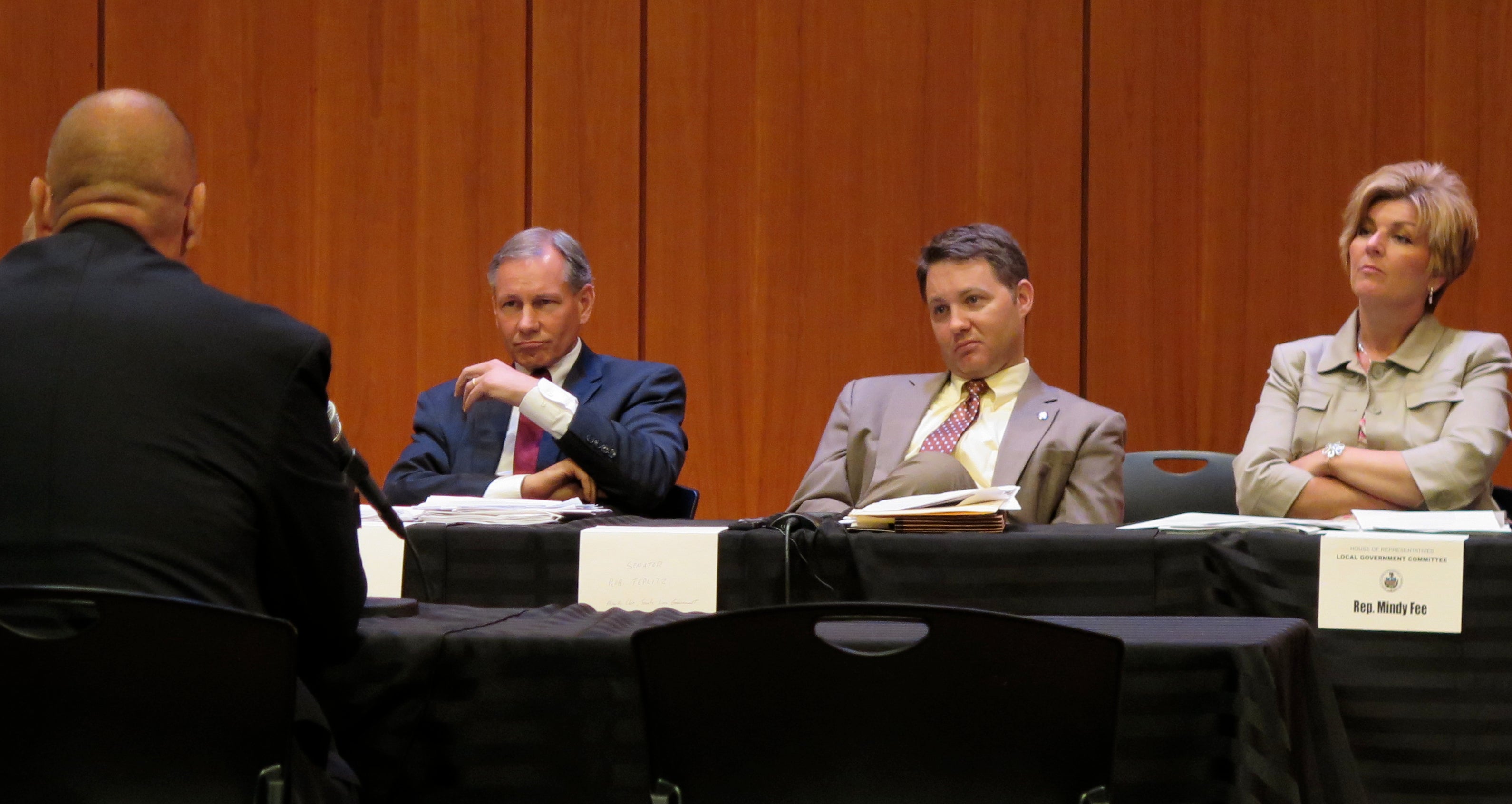Public safety union arbitration reform attempts meet resistance

State Sen. John Eichelberger, R-Blair; Sen. Rob Teplitz, D-Dauphin; and Rep. Mindy Fee, R-Manheim; listen to testimony during a joint Local Government Committees hearing. (Emily Previti/WHYY)
“It paid for my cars, my house. It did a nice job.”
That’s what Gary Lightman, an attorney for the Pennsylvania State Police Association, had to say about the Commonwealth’s arbitration law during his testimony before the state Senate and House of Representatives Local Government Committees Thursday.
Lawmakers are considering amending Act 111 in ways some say will increase transparency, reduce related costs to taxpayers and benefit public safety personnel.
Lightman, who likened the statute to the Bible, and others in the public safety camp say lawmakers might achieve similar reforms by changing other regulations – and Act 111 should stay as it is.
While it hasn’t been updated since its adoption in 1968, the law has become a “thing of beauty” regarded as a model after refinements in its application caused by caselaw and related regulations over the years, Lightman says.
Ed Troxell, director of government affairs for the Pennsylvania Association of Boroughs, disputes that.
“Back in 1968, we had black and white TV. Nowadays, we’re looking into more information more expansive information. It would be better if we had some way of knowing what these awards really meant through an analysis,” Troxell says.
Since then, the “median income of most residents in most boroughs and most municipalities [has been] outstripped by the median income of public safety, [which is] affecting the choices made by municipalities and municpal officials,” according to the association’s attorney Michael McAuliffe Miller.
That imbalance could be limited in the future by one proposed amendment that would force arbitrators to document that they’ve thought about the long-term fiscal impacts of their decisions, Miller says.
Another cuts taxpayer funding of arbitration costs to half, down from at least two-thirds under the current version of Act 111.
Another would require arbitrators to reference documented long term financial projections in their decisions – which are binding.
The bills also suggest adding a public hearing to the process.
Lightman says that’s a bad idea.
“One of the things I wouldn’t want to be talking about publicly, is how many troopers we have out in a county on a midnight. But if I don’t, I’ve failed in my mission to the state police to be able to show the danger that they’re facing out there,” Lightman says.
But the contractual and pension costs stemming from these arbitration agreements can force municipalities to reduce the police on the street, putting the public and officers themselves at risk, according to state Senate Commitee Chairman John Eichelberger, R-Blair.
Ultimately, most public safety workers also don’t want contracts or arbitration costs that overburden their neighbors, according to former police officer and State Rep. Jerry Knowles, R-Berks/Schuylkill.
But opposition also comes from legislators fearing any perception of disloyalty to police and firefighters, Eichelberger says.The Act 111 legislation has proven harder to move than other pending local governance reforms, he says.
Eichelberger says he expects movement next week on Local Government Unit Debt Act amendments, which were prompted by the debt disaster that besieged Harrisburg’s local government.
And the overhauling Act 47 for distressed municipalities is moving quickly toward a full Senate vote, he says.
WHYY is your source for fact-based, in-depth journalism and information. As a nonprofit organization, we rely on financial support from readers like you. Please give today.



